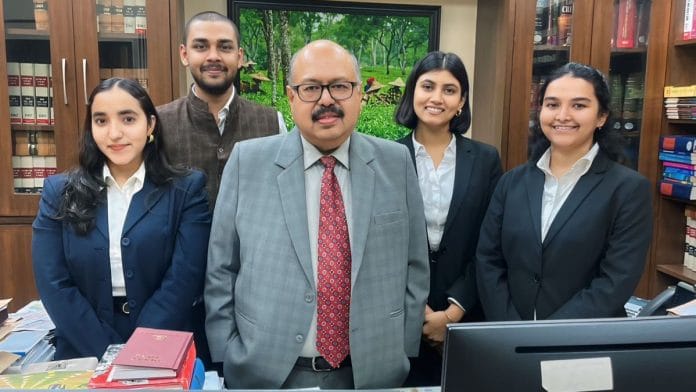About eighteen months ago, I was summoned into the chambers of Justice Hrishikesh Roy to introduce myself as his new Law Clerk. At the time, I walked in expecting to meet the judge. Instead, I found myself in the company of a theatre aficionado, someone who could dissect a performance with precision. The next time I went in, I found a former Doordarshan interviewer who had held thought-provoking conversations with the doyens of the Bar. Over the next few weeks, every time I was in the room, it was never just the judge. Instead, I met a filmmaker who articulated the nuances of cinema with the passion of a director, a bibliophile whose vast collection spanned centuries and genres, a keen history enthusiast who had previously served as a law reporter for the Assam Tribune & PTI, and a music connoisseur with profound knowledge of classical compositions who had previously served as the President of the Guwahati Music Society.
It took me a while and many enlightening conversations at 6, Tughlak Road to put the pieces together. This was not a room full of different individuals. It was just one man: Justice Hrishikesh Roy—a judge by profession, a storyteller by instinct and a polymath by sheer force of curiosity. Which, in hindsight, explains why I never saw all of them in the same room at the same time. After serving for over five years as a judge of the Supreme Court of India, he demitted office on 1 February.
As I reflect on my tenure with Justice Roy, I am overwhelmed with gratitude and admiration for an enriching journey under his mentorship. Under his tutelage, all of us law clerks have learned invaluable lessons, shared moments of pride, and, most importantly, experienced unwavering kindness and unconditional encouragement—all of which are sure to leave an indelible mark on our careers and lives. Of course, we earned the occasional rebuke as well, but each critique was delivered with the intention to mould us into better legal professionals. Justice Roy’s expectations were high, but only because his belief in our potential was higher. He pushed us to not only understand the law but also engage with it, to see beyond the text and toward the shades of reasoning that make our profession an art as much as a science.
Also read: There’s no perfect judge out there. Not even DY Chandrachud
Beyond legal wisdom
Yet, for all his sharp intellect and formidable legal mind, Justice Roy was unfailingly kind and encouraging, even when there was no reason to be. He was always quick to acknowledge our efforts and celebrate our successes, no matter how small. In fact, our regular write-ups for various news dailies are a testament to his encouragement and support.
His kindness extended beyond the courtroom—from inquiring about our grandparents’ health to granting us time off to be with our families when needed. His genuine concern for our well-being and fostering a sense of camaraderie within the team, made the court and the office feel like a second home. When one of our grandparents had to be hospitalised, not only did he make it a point to check in with us but also gave us time off for as long as we needed it. He did not just see us as his law clerks, but as individuals, young lawyers finding our ways, deserving of his attention, time, patience and respect. Greatness is measured not just in judgments delivered but in lives touched.
His passion for theatre and literature is widely known, which is why it was not uncommon for him to effortlessly quote William Shakespeare or Oscar Wilde in a conversation or judgments alike. But what is less spoken of, is his insatiable curiosity and relentless desire to explore the most diverse topics. Every week or so, a trivia, a quiz question or any obscure piece of information would set off a lively discussion showcasing his childlike eagerness to unravel new facts, connect the dots and reach the answer. Many discussions would start with questions that were never just limited to the law. Justice Roy once asked us, “Tell me something, if you had to defend a novel in court, which one would you pick and why?”, catching us all off-guard. But that was the essence of working with him—you were always on your toes, thinking beyond the obvious—much like what is expected of us as lawyers in court.
In the otherwise black-and-white world of the court and the law, Justice Roy’s wit and humour infused much-needed colour, disarming everyone present around him. When a young lawyer, visibly shaken by the gravity of the case, fumbled during submissions in the courtroom one day, Justice Roy gave him a reassuring nod and remarked, “Take a deep breath, counsel. Law is here to guide us, not intimidate us.” It is this ability to lift others up or find humour in the most challenging situations that is a rare commodity these days—a reminder that as lawyers and individuals, we need not take ourselves too seriously, but instead approach challenges with a spirit of magnanimity, optimism and light-heartedness.
As Justice Roy embarks on a new chapter in life, I am reminded of a quote from one of his favourite poets and playwrights Oscar Wilde: “To live is the rarest thing in the world. Most people exist, that is all.” Justice Roy has truly embodied that quote and ‘lived’, serving with honour, mentoring with kindness, inspiring with passion, making difficult decisions with grace, and leaving behind a legacy that will be felt for generations to come.
He has not only imparted legal wisdom but also instilled in us values of integrity, humility and compassion—qualities that will guide us for a long time.
Kumar Ritwik is an advocate. He served as a law clerk to Justice Hrishikesh Roy until his retirement. With inputs from advocate Elisha Vaswani. Views are personal.
(Edited by Theres Sudeep)






